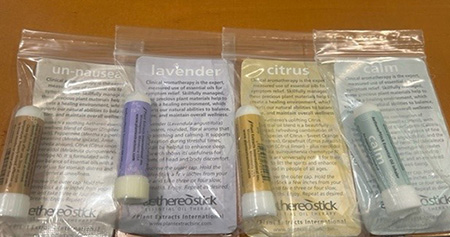The teams at UC Davis Medical Center and UC Davis Children's Hospital have a scentsational new option to reduce anxiety, increase relaxation and alleviate nausea: personal aromatherapy nasal inhalers.
Eligible patients can now receive AethereoSticks, a portable aromatherapy device that can be reused for up to three months. These resemble lipbalm tubes and are infused with essential oils.
The patient holds the tube near the nose, and the usual dose is three deep breaths, as needed.
Aromatherapy inhalers can be offered to hospitalized patients except for:
- Children under 2
- Pregnant patients
- Patients who are allergic to essential oils
- Patients with uncontrolled hypertension, uncontrolled asthma, uncontrolled high blood pressure, uncontrolled seizure disorders or atrial fibrillation.
"Once a staff member identifies a patient that could benefit from using aromatherapy or a patient or family member asks if aromatherapy can be used, an assessment is made by an RN [registered nurse] to be sure they are a good candidate to use aromatherapy. Then a personal nasal inhaler is given to the patient," said Tina Schmidt, a clinical nurse from the Pediatric Infusion Center, who was part of the aromatherapy workgroup.

Workgroup members learned more about the benefits of aromatherapy and its use in the hospital after applying for a Children's Miracle Network grant to fund a two-day class called Aromatherapy for Hospitals. Twenty UC Davis physicians, nurses, child life specialists and members of the Patient Care Services leadership team attended the class.
The program launched first in the Pediatric and Cardiac Intensive Care Unit and Pediatric Infusion Center in 2020 and has now expanded into many parts of the hospital.
Currently, 18 hospital units participate in the aromatherapy program and new units continue to sign up. A hospital policy on aromatherapy is now in use. A UC learning module, "Principles of Aromatherapy for Healthcare Providers," is available to help educate staff about using and offering aromatherapy to patients. Each hospital unit covers its own cost of providing these personal nasal inhalers to patients who might be interested.
Lavender, citrus, anti-nausea and calming blends
Currently, the essential oils available are:
- A blend called Calm to provide calming benefits.
- Lavender for relaxation, to reduce anxiety and discomfort.
- A blend called Citrus to improve sense of well-being, enhance mood and reduce nausea.
- A blend to reduce nausea called Un Nausea.
They are not to be used directly on the skin or ingested.
"Aromatherapy is intended to enhance, not replace, a patient's current medical plan or therapy," said Schmidt, who notes that it is not considered a medication.
Feedback so far has been positive for patients who have requested the aromatherapy inhalers.
"From what we have heard, patients have had positive responses or showed some type of improvement and would use it again," Schmidt said. "We hope to continue to expand this program across our health system."






